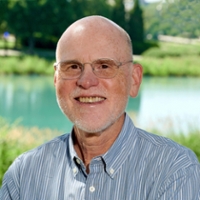What is Biotechnology?
Program director William Miller examines what biotechnology is and how it's improving the world.
Last summer I had a meeting in my office in Northwestern University's Technological Institute, the home of our Master of Science in Biotechnology program (MBP), with the daughter of a professional colleague.
 She is a high school student interested in math and science and is beginning to consider different careers. She had heard of biotechnology and was excited to meet with a university professor, but she wasn't sure what the term meant and she seemed hesitant to ask me to explain. This was not surprising because biotech can be difficult to define. We talked for about half an hour and she seemed satisfied with my answers and inspired by the possibilities of biotechnology.
She is a high school student interested in math and science and is beginning to consider different careers. She had heard of biotechnology and was excited to meet with a university professor, but she wasn't sure what the term meant and she seemed hesitant to ask me to explain. This was not surprising because biotech can be difficult to define. We talked for about half an hour and she seemed satisfied with my answers and inspired by the possibilities of biotechnology.
That conversation stuck with me, though. It made me think about how I explain what biotech is, and this is what I came up with.
Biotechnology harnesses the potential of cells and biological molecules to benefit people and the environment.
Biotech can present itself in many forms. For example, which of the descriptions listed below is not an example of biotechnology?
- Yeast cells have been used for thousands of years to produce bread, beer, and wine. Yeast and other microbial cells are now being used to produce biofuels, cultured food products (yogurt, soy sauce, etc.), and enzymes (used in laundry detergents to remove stains, cheese processing, and the textile industry).
- Bacteria remove excess nutrients in wastewater treatment plants, and some bacteria are able to degrade toxic chemicals, such as solvents used in dry cleaning, at Superfund sites.
- Bacteria and fungi naturally produce antibiotics, which can be chemically modified in the lab to produce modified antibiotics to slow the development of antibiotic resistance.
- Recombinant DNA technology — or genetic engineering — has allowed yeast and bacteria cells to produce protein and peptide drugs, such as insulin and human growth hormone, in large bioreactors.
- Genetic engineering of animal cells has facilitated the production of complex proteins, including the monoclonal antibodies that have transformed the treatment of breast cancer, arthritis, and many other diseases.
- Genetic engineering has also been used to develop food plants that are more tolerant of drought or can grow in brackish water.
- One type of drug, called checkpoint inhibitors, removes the “brakes” on the immune system, which allows T cells to more effectively kill tumor cells. Alternatively, a patient’s immune cells can be harvested, activated in culture, and reinfused back to the patient to attack the tumor.
- Gene therapy that replaces defective genes with normal genes in humans has shown tremendous potential to treat genetic and inherited disorders.
- Synthetic biology builds on advances in cell and molecular biology for the development of modular building blocks used to create specialized cells and biosynthetic pathways in a design-build-test cycle. The resulting specialized organisms can be used to convert greenhouse gases (e.g. carbon monoxide, carbon dioxide) or even landfill waste into the fuels and chemicals that otherwise come from petroleum.
Can't figure out which one doesn't belong? That is because, in fact, all nine of those descriptions are examples of biotechnology. The field is so diverse — and it's impact can be so far-reaching.
I think back to a blog post here from earlier this year where recent graduate Lachelle Brooks (MBP '17) describes how she wants to save the world with biotechnology. Here is what she said:
Because biotechnology encompasses so much diversity within the field, I feel that it is one of the best solutions to many world crises. Environmental issues, healthcare and pharmaceutical issues, point-of-care and accessible technological issues are all currently being solved in the field of biotech. Biotechnology is a global phenomenon, in my opinion, and I believe its sole purpose is to put the world on a fast-paced road to recovery. So when I say I want to save the world with biotech, I literally mean that. I want to continue to be a part of a field that is setting its course to solve global dilemmas.
Biotechnology is trying to make the world a better place. If you want to be part of the change, let us know. We're always looking for the next great innovator who can help push the industry forward.
William Miller is the program director of Northwestern University's Master of Science in Biotechnology program (MBP).

